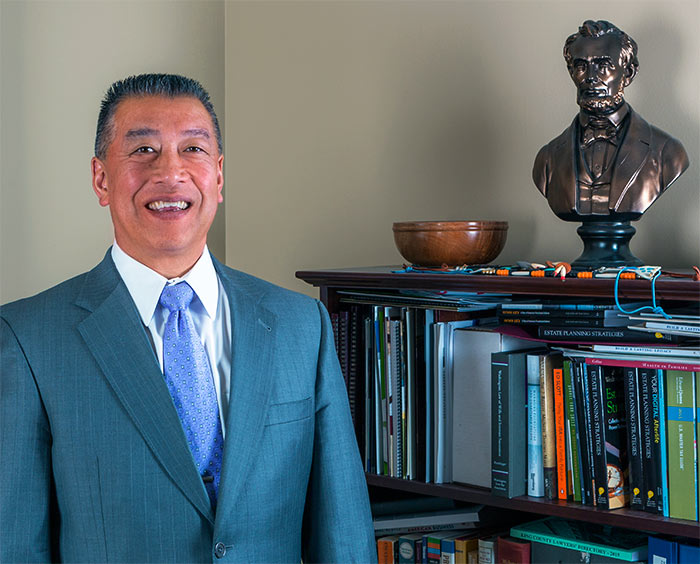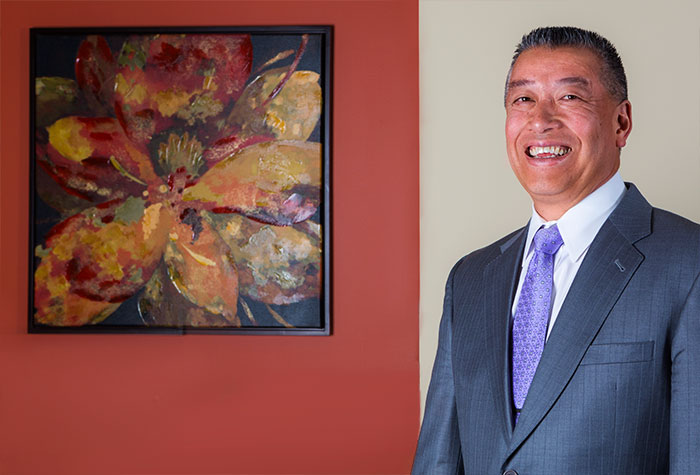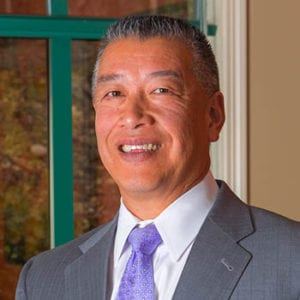A passion for building wealth

Dennis Yamasaki • Lynnwood, WA
Affirmative Financial Services
Read full biography below
Proactive Advisor Magazine: Dennis, what drives your passion in helping clients plan for their future?
I share an investing story with all of my clients that highlights the importance of risk management in preserving and growing capital. Back before I entered the financial-services industry, I had a successful career as an engineer. I had built up a fairly sizable investment portfolio, which I managed myself.
I have always been very analytical and data-driven, so I was confident in my ability as an investor. Since I had worked in the technology area, I also felt pretty comfortable with my ability to assess some of the trends in the late 1990s and early 2000s. I was doing very well with my investments, but definitely became too aggressive. The dot-com bust hit and you can imagine the outcome: My portfolio was cut in half. I also had some financial needs over the next few years and had to pull from the remaining funds, which meant it would be very difficult to ever fully recover.
In a nutshell, I personally made just about every classic mistake you could. I did not have a real financial plan, I took on too much risk, I was not mindful of the sequence of returns, and I thought I had the ability to self-manage my investments. While this is a painful story, it is one that clients find meaningful and they know is heartfelt. It helps set the stage for our discussions and how I can help them approach a financial and investment plan that is very concerned with managing risk.

Take the story a step further. How then do you help clients manage risk?
First, I explain to clients that this entire personal situation was one of the motivating factors for me entering the financial-services industry. I was determined to study hard and learn how to approach the planning and investment world with a thorough grounding in both fundamental and modern principles. Second, I am convinced that I can help clients avoid the types of mistakes I made, as well as many others.
“Active managers cannot predict with 100% certainty when recessions will start and end. But they certainly can improve the investment odds and probabilities for my clients.”
I am passionate about helping clients protect what they have, both from an insurance and investment perspective. But I am equally passionate about helping them grow their wealth. I see clearly in hindsight how an actively managed and more conservative approach could have had a tremendous impact on the bottom line of my personal portfolio. That starts with avoiding the big losses concentrated around a large market decline—the power of not losing money is often more powerful than only focusing on investment gains.
I started my financial career on the insurance side of the business and a few years later moved on to more holistic planning and investment management. I then was exposed to active money management and have become a true believer in that philosophy. We know all about economic and market cycles from history. There will be boom and bust cycles, recessions, and bear markets. Active and tactical managers cannot predict with 100% certainty when these will start and end. But they certainly can improve the investment odds and probabilities for my clients with their focus on risk-adjusted returns. That is the essential message I deliver to clients, and, for just about everyone, it makes perfect logical sense.
Talk about your practice. What types of clients do you work with, and what types of services do you provide?
I think a prospect’s mindset is every bit as important as their demographic. Do they want to fully engage with my process, and are they serious about taking a total look at their financial picture? From a practical perspective, most people get more interested in creating a financial plan when they are starting to think about retirement. That is true of many of my clients—they tend to be in their fifties or older. However, the technology industry is growing tremendously in the Seattle area, and I am doing a lot of prospecting with younger people. These individuals have the potential for significant earning power over their lifetime and will need the services of a wealth advisor as they progress and grow in their careers.

I have a network of outside resources that allows me to deliver a full range of services to clients, whether they are an individual or couple, a commercial enterprise, or a small-business owner. I will work with company owners on their own wealth-management needs, business-succession planning, their company’s 401(k), and benefits plans for their employees. For every client, I can offer a full range of insurance products, investment services, and legacy planning. In many cases, I will pull from my network resources and bring in a CPA, property and casualty specialist, or estate attorney if the need arises.
Some of my clients jokingly refer to me as “the anti-tax guy.” That, of course, is not true. But I do take great pride in working with clients to minimize their tax liabilities all across their financial planning. This is especially true in retirement-distribution planning, as I try to minimize tax obligations and help clients leave a legacy for their families or charitable causes.
Talk about the process of introducing clients or prospects to active investment management.
My practice is primarily fee-based, and the use of outside expert money managers is a key component of that. I spend a tremendous amount of time with clients on discovery around their total financial needs. That will lead naturally into a discussion on how my firm’s investment approach might be different from the ways they have invested in the past.
I like to start with a discussion with clients about their personal investment experiences, focusing on their returns, as well as their emotional state of mind, during the last two major market downturns. We will then probe their current attitudes about risk.
I also go through an exercise with them. We will pick an asset level of $100,000 and show how an actively managed portfolio would have grown from 2001 to today, factoring in real strategy results and no distributions. I will assign a middle-of-the-road risk profile for that strategic allocation. Just for fun, I call this the “Mikey Moderation” portfolio strategy. I compare that to a typical allocation mix for a buy-and-hold passive mutual-fund strategy.
The results are usually very surprising to people, strongly favoring the active management portfolio approach. I emphasize that there is no guarantee of the results they may achieve in the future, but also that these are real strategies with verifiable track records. The overall message is simple:
- Managing risk can have a big impact.
- You do not have to go for home runs or try to beat the market.
- Compounding works in your favor over all kinds of market cycles.
- It is critical that you avoid periods of big market losses.
I am a very positive person by nature and love to help people find a way to build their wealth. My attitude is that my clients can minimize the risk associated with poor economic periods and grow their assets during the recovery periods of the economy. This is a very reassuring message for people—that they can attempt to exercise far more control over their investing future than they thought possible.
 Dennis Yamasaki is the president and owner of Affirmative Financial Services, a registered investment advisory firm located in the metro Seattle area. Mr. Yamasaki has over a dozen years of experience in the financial-services industry, with specific expertise in real-estate financing, retirement and investment planning, and addressing clients’ life- and health-insurance needs. He works with both individual and commercial clients. “Developing tax-advantaged strategies is a real passion of mine,” he says.
Dennis Yamasaki is the president and owner of Affirmative Financial Services, a registered investment advisory firm located in the metro Seattle area. Mr. Yamasaki has over a dozen years of experience in the financial-services industry, with specific expertise in real-estate financing, retirement and investment planning, and addressing clients’ life- and health-insurance needs. He works with both individual and commercial clients. “Developing tax-advantaged strategies is a real passion of mine,” he says.
Mr. Yamasaki was born in the Philadelphia area and moved with his family to the Seattle area at a young age. He attended the University of Washington, where he received a bachelor’s degree in business, with a focus on quantitative methods, finance, information systems, and statistics. “Math and its practical applications have interested me ever since junior high school. I believe that quantitative analysis has a large role to play in both financial planning and investment management,” he says.
A systems and network engineer early in his career, Mr. Yamasaki worked for several well-known firms in the aerospace, communications, and network fields. His positions in this area often included managing the intersection of engineering, sales, and marketing. He says this “instilled in me the importance of being a team player and recognizing the needs of others, and it honed my ability to bring the right people together to solve problems. I use these same skills in my advisory practice, assembling expert resources no matter what area of financial or investment planning we are talking about.”
Mr. Yamasaki resides in Seattle and has a teenage daughter. He enjoys spending time with his extended family and getting involved with his local community. He takes particular interest in the technology area and belongs to several networking groups related to tech and entrepreneurship. Mr. Yamasaki says he is supportive of causes related to child welfare and development, economic empowerment, and health care.
Disclosure: The views and opinions are those of the interviewee only and do not represent or endorse any product, service, or affiliated firm.
Photography by Frances Zera

